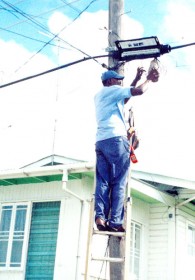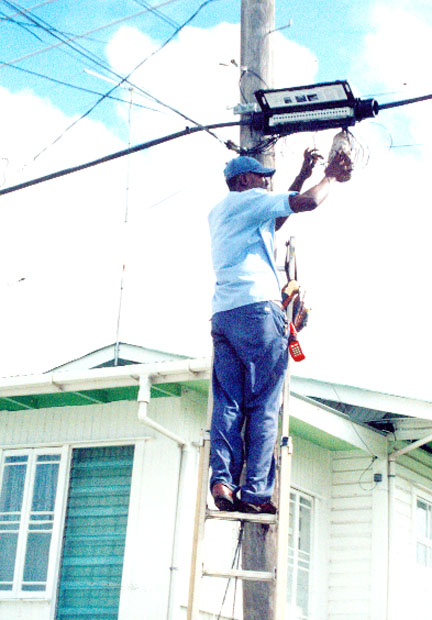– six cases of theft recorded in south Georgetown since April
Metal thieves continue to target the critical insulated copper cable used by the Guyana Telephone and Telegraph Company (GT&T) to provide its landline telephone service and the company’s Security Manager Edgar Blackman told Stabroek Business earlier this week that the recent spate of thefts has targeted the company’s installations in a section of south Georgetown where several scrap metal dealerships are located.

“We are not seeking to apportion blame or to point fingers at any particular individual or individual business. What I can say, however, is that these are huge cables and both the logistics and the risks involved in moving stolen lengths of cable over long distances are considerable,” Blackman told Stabroek Business.
According to the GT&T official there were six cases of cable theft in the Charlestown area between April and May this year. A further incident of vandalism and cable theft occurred recently on the West Coast Berbice, while earlier this week the thieves struck again in America Street.
Two weeks ago Prime Minister Samuel Hinds announced that government has imposed yet another ban on the scrap metal trade following another upsurge in vandalism and theft of metals targeting several state institutions and utility companies. An earlier ban on the export of scrap metals more than two years ago had followed the widespread targeting of GT&T, Guyana Water Inc and Guyana Power and Light Company installations that resulted in vigorous lobbies from the three entities for measures to put an end to the practice. Blackman said that while the ban had resulted in a significant reduction in losses by GT&T, the problem had surfaced again in recent months.
Asked about any additional security measures which the company had put in place to protect its installations Blackman said that there was little that the company could do beyond seeking the help of the police. “Our land line telephone service is provided through the cable system and our line plant runs all over the country. There is little that the company can do to protect the cables,” Blackman said. He said that in the wake of the recent spate of thefts in the south Georgetown area the company had been contemplating engaging the metal dealers in the area in an effort to secure their help in arresting the practice. “As it happened, the recent ban announced by the Prime Minister occurred shortly before we had planned to engage the metal dealers,” Blackman said.

The GT&T security manager told Stabroek Business that the cost to the company in cases of stolen cable and attendant damaged infrastructure went far beyond the cost of the cable. “Since stolen cable means the disruption of both domestic and business telephone services the company is required to move to remedy the damage immediately. We have emergency crews in place that are equipped to provide an immediate response at any time of day or night and in any weather conditions. Unlike in the case of an electricity supply situation where the problem can be remedied through the reconnection of a single cable, repairs to severed telephone cables involve the painstaking re-connection of what, in some cases, is several hundred lines.
What this means is that our crews must work continually, sometimes over several days and nights to restore telephone services.”
Meanwhile, Blackman said, the company’s Americas 11 fibre optic cable which serves as a conduit for voice and data traffic in and out of Guyana also remains vulnerable to sabotage and vandalism. He said the targeting of the fibre-optic cable is also believed to be the work of would-be copper thieves. “Once the cable is cut and they discover that there is no copper to be stolen they simply leave it as it is.
Here again, there is a cost to restoring the service. GT&T’s US$30 million investment in a new submarine cable is expected to provide significant levels of redundancy in the event of damage to the Americas11 cable.
GT&T also continues to incur losses resulting from damage to its sub-surface telephone cable network during excavation work carried out by other utility companies. Blackman says that such losses persist despite several attempts by the company to collaborate with the other entities that regularly carry out such excavation work as part of their own service provision.
Blackman said while GT&T makes efforts to notify those entities of the location of its cables prior to the start of excavation works, such works are frequently carried out by sub-contractors who are less mindful of the presence of the telephone cables. “There are cases in which cables are severed in more than one place before the damage is done,” Blackman said. He added that while understandings exist with regard to those entities meeting the cost of the damaged cables, amounts totalling “millions of dollars” remain outstanding.

